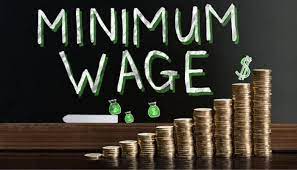BY BEN EGUZOZIE
Minimum Wages 2023 report
-
Scores 0% in minimum wage to food price ratio
-
Basket of basic food necessary to live costs 160.4%
-
Against minimum wage of N30,000
Nigeria has been ranked in 67th place in a worldwide survey of minimum wages carried out in January 2023. With a net monthly minimum wage of N30,000, which was the same as last year’s, against record food inflation of 23.72 percent (as of October 2022), the country scored zero percent (0%), putting it in bottom position out of 67 countries surveyed globally by Picodi.com.
According to the research, the basket of basic food necessary to live costs N48,130 which is 160.4 percent of the country’s minimum wage of N30,000. “This means that the minimum wage is not enough to cover even such a basic basket of products,” the research analysts said.
This is light years behind citizens of the UK who enjoy the best minimum wage to food price ratio of 6.5 percent.
The analyst team at Picodi.com (for the fifth year) has created the Minimum Wage report. The team checked how the minimum wage changed in 2023 in over 60 countries worldwide, and if such a wage is enough to ensure a minimum standard of living in those countries.
In Nigeria, nothing changed on what employees on minimum wage earning of N30,000 net monthly, which was same as last year. This ranks the country in 67th place of the ranking (0%), as the basket of basic food necessary to live costs Nigerians N48,130 or 160.4 percent of the minimum wage (last place in the ranking). This is compared to 2022 rate of 136.6 percent of the contemporary minimum wage.
“This means that the wages of those paid the least (Nigeria) increased slower than the food prices; and the minimum wage is not enough to cover even such a basic basket of products,” the analysis indicated.
For example, the price of an identical shopping basket in Nigeria in previous years were: January 2019 – N31,536; January 2020 – N32,420; January 2021 – N35,360; January 2022 – N40,980; and January 2023 – N48,130.
Basic food survival basket
Elsewhere, the study created a contractual shopping basket and juxtaposed the price of food with the minimum wage. In Nigeria, the basket consists of eight groups of products such as: bread, milk, eggs, rice, cheese, meat, fruits and vegetables. The list is very limited, but those products in the given amounts are enough to meet the minimum nutrient requirement for an average adult. These are: milk (10 litres) – N60.90; bread (10 loaves, 500 g each) – N31.70; rice (1.5 kg) – N12.08; eggs (20 pcs) – N15.60; cheese (1 kg) – N26.13; poultry and beef (6 kg) – N226.26; fruits (6 kg) – N39.24; and vegetables (8 kg) – N39.56.
By far, it is on record that the above basic food basket is rather a luxury today in most Nigerian homes, with an estimated 133 million of them said to suffer multidimensional poverty, according to recent data by the National Bureau of Statistics (NBS).
In 2019, experts at the Nigerian Institute of Animal Science (NIAS) warned that Nigeria’s livestock production and productivity must increase by at least 60 percent if the country has to satisfy its animal protein consumption requirement, whose demand far outstrips the supply. Also, the Food and Agricultural Organisation (FAO) says Nigeria has one of the lowest animal protein consumption in the world, with the diet of an average citizen running 20 times lower than FAO recommended requirement.
Wages catching up with inflation
In 67 countries surveyed, the minimum wage is set by the government. Tax systems in these countries can be very different, and the difference between gross and net income can range from 0% to as much as 35 percent. But in Nigeria it is 0%. Nigeria is among only seven out of 67 countries where the minimum wage did not increase compared to January 2022. Among others, the countries are Israel and Hong Kong.
The highest year-to-year minimum wage increase was noted in Argentina, with 104.5 percent and Turkey (100%). Others with a high minimum wage increase are Moldova (32.5%), Latvia (27.1%) and Malaysia (25.8%). In these countries, both inflation and devaluation of currency have been exceptionally high in recent years. High pay raises can be enjoyed by those paid the least in, among others, South Africa (6.9%) and the United States (12.6%).
Where can you live off the minimum wage?
Food preferences and perceptions of a comfortable life vary from country to country; and even from person to person. Comparing the prices of the same basket of food with the minimum wages to see how much of the minimum income has to be spent on products necessary to live indicated that, the UK came off as the best basic food price ratio. Others are Ireland and Australia – from 6.5 percent to 7.7 percent.
But Nigeria, in the last spot (67th) in the ranking, with a ratio of 160.4 percent%, was far behind countries such as South Africa (35.6%, 50th place), the United States (12.5%, 11th place) and the United Kingdom (6.5%, 1st place). In Asia-Pacific countries such as India, Indonesia, the Philippines, Thailand and Vietnam, basic food costs over half of the minimum income. In Nigeria, the minimum wage is not enough to cover even such a basic basket of products.








